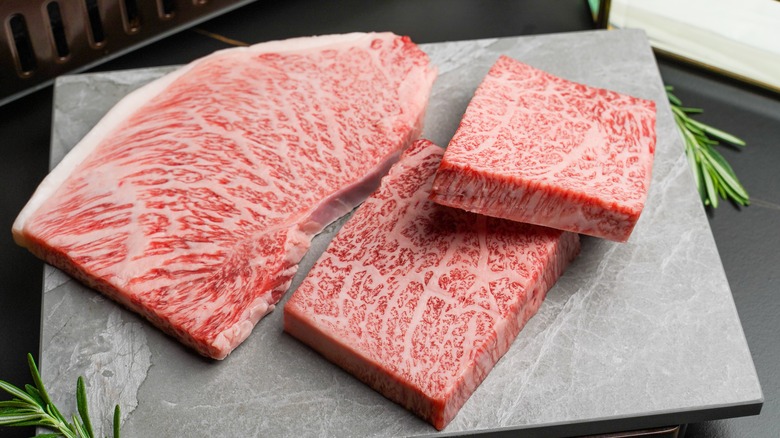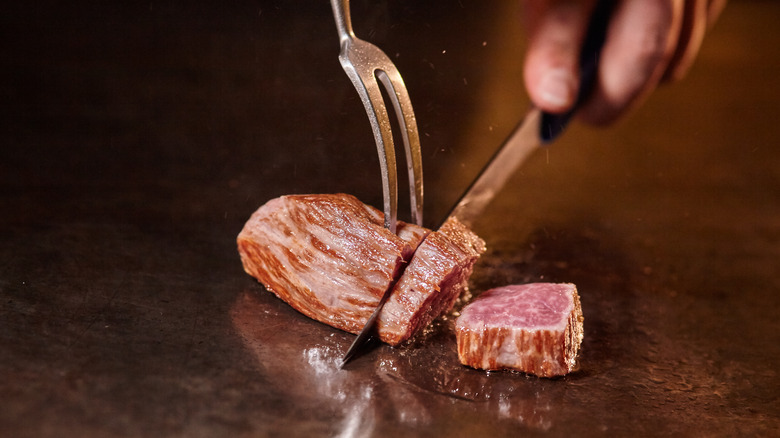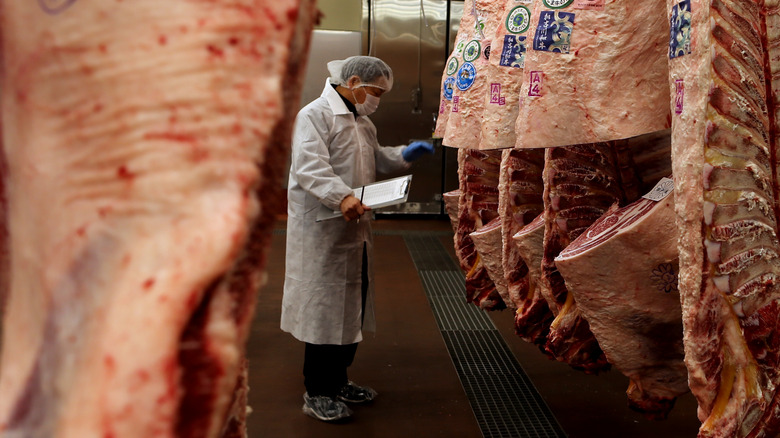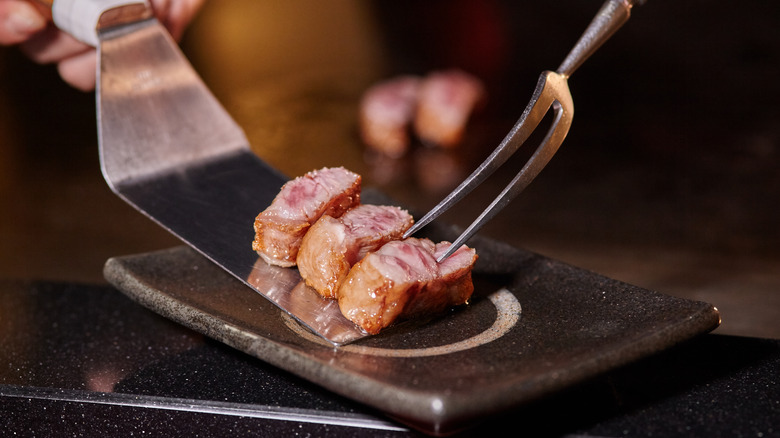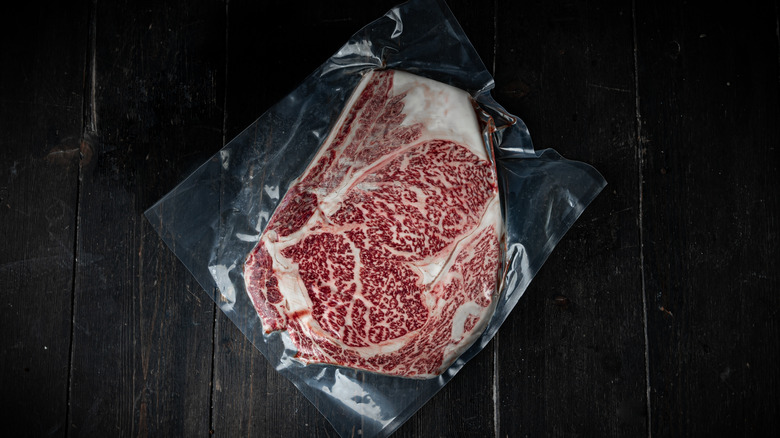Why Is Wagyu Beef So Expensive And Is It Worth The Price?
If you've ever seen Wagyu steak — or more likely Wagyu sliders — on the menu at an upscale steakhouse, chances are it was one of the most (if not the most) expensive food items at the restaurant. As much as Wagyu beef has a reputation of being the best steak you'll ever eat, it's also known for costing an arm and a leg. According to Insider, Grade A certified Wagyu raised in Japan can cost upwards of $200 per pound, and the individual cows that produce them are worth $30,000 at auction, or 40 times that of a typical cow sold in the U.S.
Considering how much of a delicacy Wagyu beef is, it might seem like Japan has a monopoly on the product. However, the price you're paying isn't just an upcharge: As it turns out, there's a lot that goes into producing Wagyu beef, and it isn't anything like the other types of meat you'd find at your local grocery store.
What exactly is Wagyu beef?
When you buy beef, there are plenty of options out there. There are different cuts, like chuck, sirloin, and round, but Wagyu isn't just a different section of the cow. The meat comes from an entirely different breed of cattle, one that is native to Japan. According to the American Wagyu Association, there are four major breeds that are used for Wagyu production: Japanese Black, Japanese Brown, Japanese Polled, and Japanese Shorthorn. Thanks to a combination of favorable genetics and unique cultivation conditions, these breeds are able to produce beef that has a much higher ratio of mono-unsaturated to saturated fat, making it extremely tender and more marbled, giving it an extra rich and indulgent flavor.
Wagyu-style beef can technically be replicated outside of Japan, but as the American Wagyu Association shares, Japanese Polled and Shorthorn cows aren't bred anywhere else. According to The Meatery, most American "Wagyu" actually comes from a 50/50 cross between a pure-bred Wagyu and Angus cattle, and therefore has a slightly different flavor, texture, and marbling compared to Japanese Wagyu.
Here's what you're paying for
Although the word Wagyu literally translates to "Japanese cow" in Japanese (via The Meatery), not all Japanese cows can be considered Wagyu. Eat This, Not That explains that farm-raising Wagyu cattle is a very involved, time-consuming process, one that includes genetic testing regulated by the Japanese government. Cows must have a certain DNA rating to be bred for Wagyu beef, and they must also undergo a two-year fattening process where they are fed "a mixture of fiber and high-energy concentrate" and carefully monitored until their body mass reaches 50% fat," Insider elaborates.
But it doesn't end there. Insider adds that only castrated bulls raised in the city of Kobe can be bred for Kobe beef, a special type of Wagyu. And per Robb Report, farmers even monitor the stress of their cattle. Stress causes cortisol levels to rise, which in turn negatively affects the quality of the meat.
Is Wagyu beef worth the price?
Anyone who can appreciate a good steak will undoubtedly find Wagyu beef worth the price. The difference between any regular kind of beef and its Wagyu equivalent lies in the marbling, which comes from intramuscular fat cells. The way wagyu cows are raised increases their physical endurance, causing their fat cells to be distributed more evenly within their muscles. This is precisely what makes wagyu pinker and far more tender, Insider states. Regular beef, and even Angus and grass-fed varieties, aren't cultivated in a way that produces nearly as much marbling, and when cooked, doesn't yield the same results.
The reason for this, as MasterClass explains, is that during the cooking process, the marbled fat melts into the muscle fibers of the steak, allowing it to retain more moisture and flavor. Wagyu beef has much more of this. Too much fat might seem like a bad thing, but MasterClass shares that Wagyu beef fat contains higher levels of a heart-healthy fatty acid called oleic acid. So if you want to enjoy steak at its fullest possible potential, Wagyu is certainly worth its price tag.
Where to buy Wagyu beef
It's no secret that Wagyu doesn't come cheap, so if you see it priced suspiciously low, there's a good chance it may not be the real deal, especially in the U.S. Bon Appétit revealed that the Kobe variety of Wagyu is often falsely advertised as authentic, and it's such a common occurrence that in 2016, it prompted investigations and lawsuits against a number of major brands and well-known restaurants.
If you want real Wagyu outside of Japan, therefore, the best way to go about it is to order it through a Kobe-certified distributor. According to one such distributor, The Meatery, labeling laws make it difficult for consumers to identify real Wagyu, so look for packaging that states both the genetic makeup and the farm that the meat was sourced from. Wagyu labeled as "Kobe style" isn't actually Wagyu, The Meatery points out, so just be wary of clever marketing and restaurants capitalizing on the popularity of the product.
